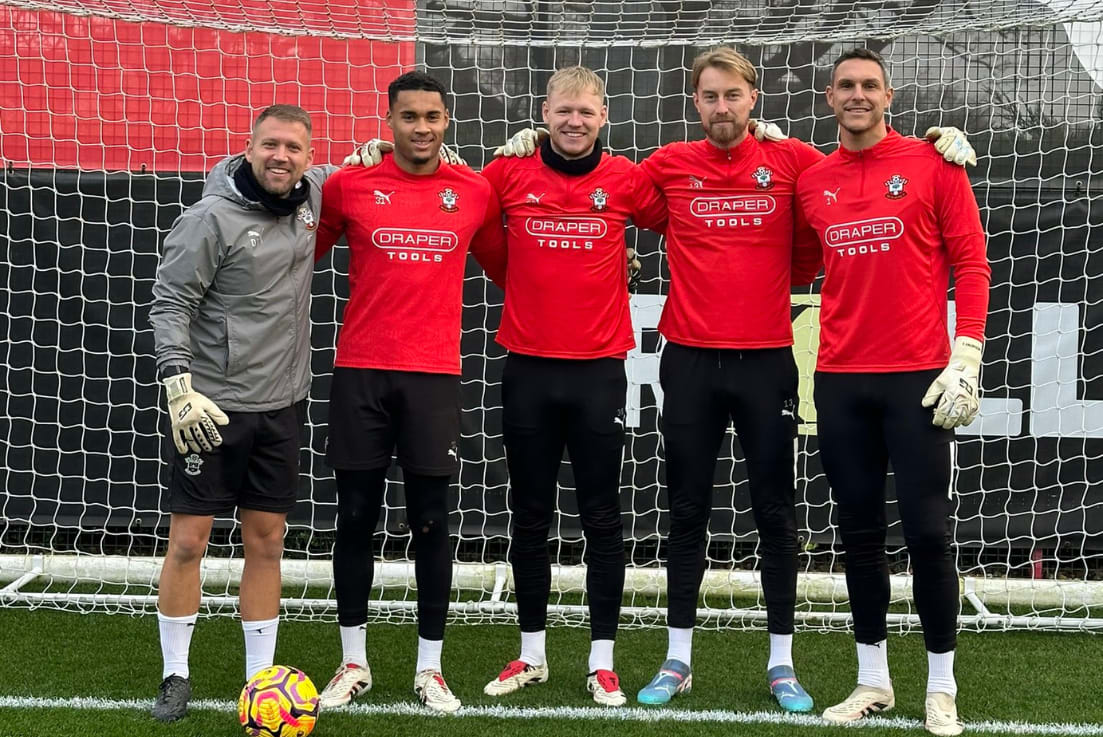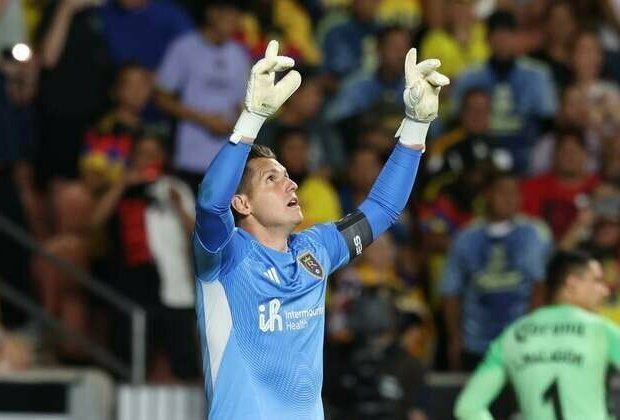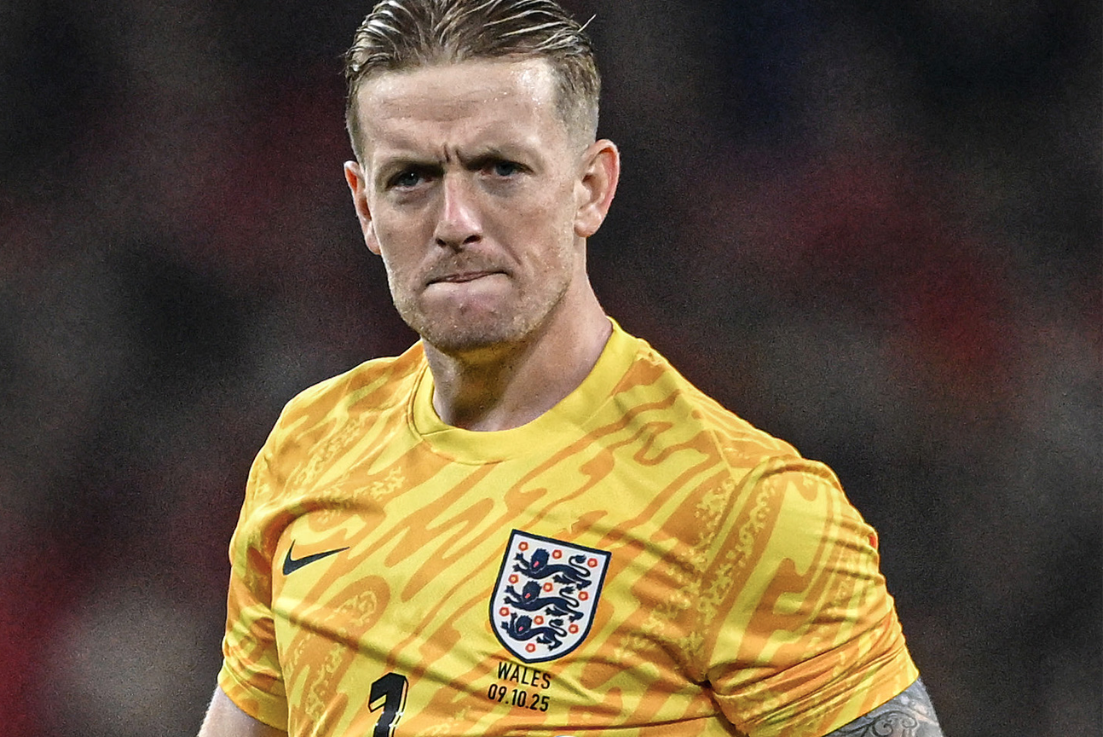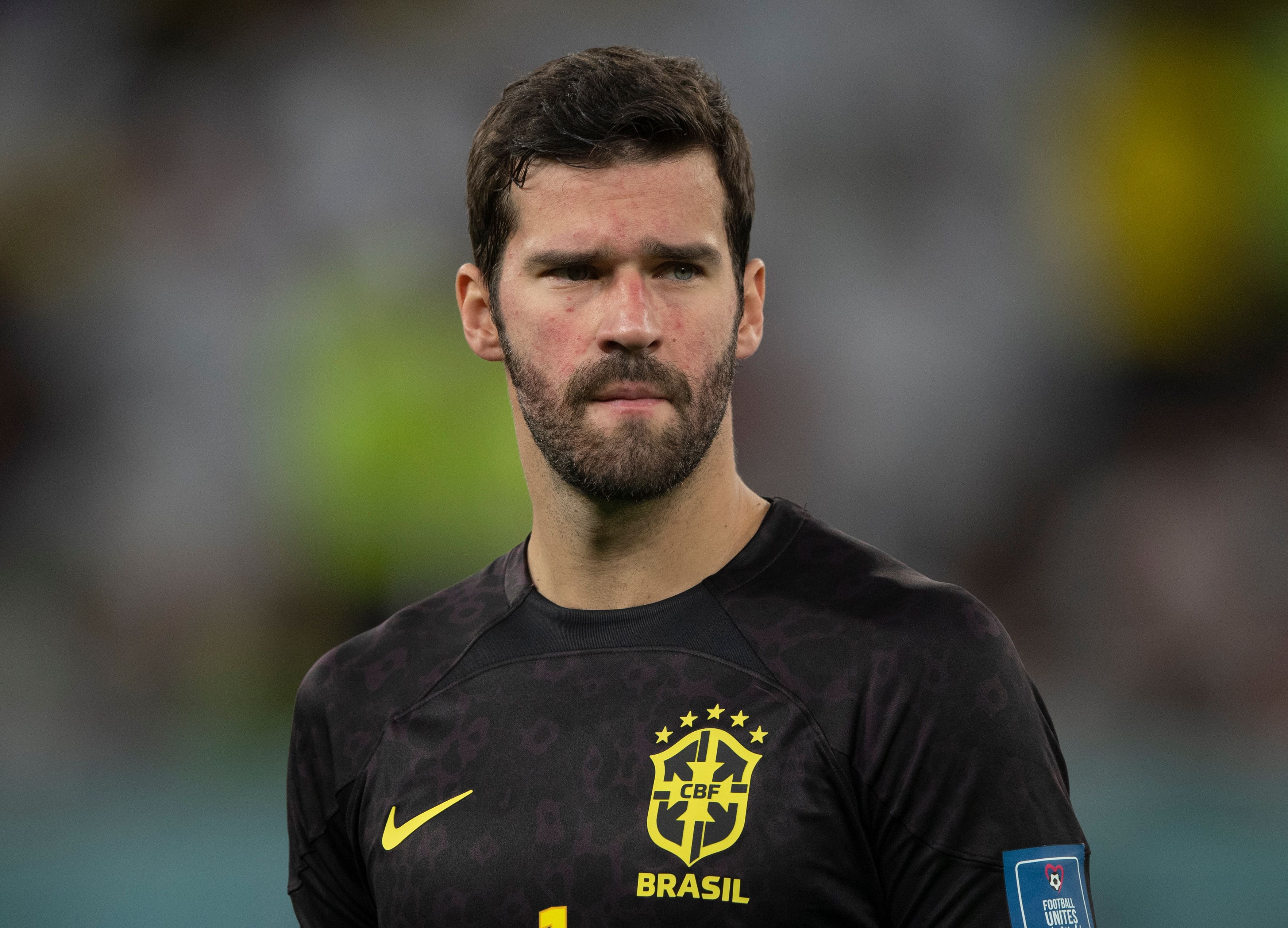Learning from Aaron Ramsdale, Alex McCarthy, Rob Green, Julio Cesar, and many more has taught Southampton's goalkeeper coach the value of absorbing as much wisdom as possible.
Header Image: Stuart Martin/Daily Echo
Dean Thornton has worked across the football pyramid as a goalkeeper coach, previously at Queens Park Rangers, Milton Keynes Dons, Swindon Town and Swansea City, and currently at Southampton. “17 years later and I’m still coaching,” he says, speaking exclusively to Goalkeeper.com. “I started this journey so young. I made the right decision to go down this route.”
Thornton’s fantastic coaching journey stemmed from a lower profile playing career. As a young boy, he endured a rocky start to life on the pitch. “I was picked for QPR when I was eight,” he recalls. “At 13, I decided I’d had enough of football and rejected their contract offer. Three weeks later, I realised I made a mistake. My dad got called by my former goalkeeper coach at QPR. He’d moved to Wycombe Wanderers and asked if I wanted to join him. I stayed as a first-year Pro from 13 until 19 and got released. During that time, I broke my leg and tore my cruciate. I fell out of love with playing the game.”
Thornton’s enjoyment had evaporated but a new calling quickly beckoned that reignited his love for football. He never looked back.
“I received a phone call from Steve Gallen, who is now Sporting Director of Millwall, but he was at the time Academy Manager at QPR and my former coach at under-10 level,” he remembers. “He asked if I’d be a part-time goalkeeper coach for the academy. I’d never thought about coaching.
“I started coaching at 19 and spent nine years at QPR. I oversaw the academy from ages nine to 21. Towards the end, I worked with the first team. The first-team goalkeeper coaches included Kevin Hitchcock, Gavin Ward and David Rouse. They made me feel very welcome. Regarding players, I worked with Rob Green, Julio Cesar, Paddy Kenny and Radek Černý.”
Thornton has formed a close bond with Russell Martin and has been part of his coaching staff since 2019, until his sacking at Southampton at the end of 2024.
“I’ve known Russell since I was 16. We worked together for five years. It’s been a real learning experience. Russell has left Southampton and I’m still here. It's been tough to not see or work with him daily. I’d like the opportunity to work with Russell again. I'm grateful to Russell for what he's done for me and my family. I loved working with such a young and incredible manager.”
Martin became synonymous with a very distinct style of play that focused on keeping the ball. This placed increased emphasis on the goalkeeper to consistently facilitate the build-up. Thornton loved Martin’s philosophy.
“When he started at MK Dons, he called me and asked if I’d be his goalkeeper coach. He had a clear plan. We spent hours upon hours and days upon days going through his philosophy, style of play and what he expects from a goalkeeper. He wanted to have possession and for his team to enjoy it. I was all in for Russell’s style as a goalkeeper coach. When you're playing in a team that wants the ball, it gets highlighted if the goalkeeper is uncomfortable. The goalkeeper is there to be part of possession, the build-up and how to start an attack. I think it increases enjoyment and brings out the best in the goalkeeper.”
In August 2024, Aaron Ramsdale joined the Saints from Arsenal. Thornton was “delighted” and described it as a “massive signing.”
“Russell asked me who I wanted after the play-off final. He believes in the goalkeeper coach looking after the goalies. Russell spoke to Aaron about what he wanted from his goalkeeper, and I talked to his agent about what I was looking for. Aaron wanted to play regularly in the Premier League and get back into the England set-up. I can't speak highly enough of him as a player, but also as a lad, he's brilliant. He's a pleasure to work with, alongside the other goalkeepers.”
The Southampton goalkeeping department currently possesses Ramsdale, Alex McCarthy and Joe Lumley, while Gavin Bazunu has joined Standard Liege on loan. Thornton provided an incredible insight into how this dynamic works and how goalkeepers get the best out of each other.
“I have a great group. I’ve known Alex since he was 14, we were at Wycombe together. I was at QPR when we signed Joe. You can tell when you've got a good group through the ones not playing. I told Joe he would be our number three in the Championship. My reasons were that he could help us with our style because he’s very good with the ball at his feet and he would drive sessions by facilitating the number one through encouragement.
"Joe was a massive reason for why we got promoted. He helped Gavin and is now doing the same with Aaron. In terms of how we get the best out of each other, it's healthy competition. We’re always challenging each other. All four can fight for a shirt. You just need to set expectations early on.”
Despite being a top-flight goalkeeper coach, Thornton reaffirms that he is still learning, and cultivating strong relationships is paramount for success.
“On and off the pitch, I learn every day from these boys because they’ve all had different journeys and played various roles for the team,” he enthuses. “Alex and Aaron have spent many years in the Premier League so I’ve picked their brains on their experiences.
“As a group, they're all harsh on themselves. Premier League and Championship players always want to improve and learn. In my experience, working in League One and Two, some players don’t want to hear what you tell them. They think they know it. That can be the difference as to why they’re not playing at a higher level.
“Some experiences that I've had this year, if I take a step back, I could have handled better. I’m being honest and looking at myself as a young goalkeeper coach. If it came again, I'd change, but you're everything. You're their coach, teacher, mentor and family. They must know you have their back at all times.”
Regarding player development, Thornton strongly believes clubs should take more advantage of the loan system to prepare young players for senior football at higher levels.
“They should go out on loan and play men’s football as early as possible,” he states. “I don't believe there's a bad loan for the goalkeepers, as long as they're safe and avoid injuries. This makes them ready for the first team. We need to test goalkeepers more in this country to make them better at earlier points in their careers, rather than playing youth team football.”
Southampton’s goalkeeping guru possesses a keen eye for talent and believes that positive integration with the first team is crucial for progression: “I look for how hungry they are to train with the first team. Once they train with the first team, how do they behave? Do they think they've cracked it?
“If they make an impact, I'll speak to the seniors and ask what they think. I’ll also look at how they interact with the seniors. Are they quiet and reserved? I tell every goalkeeper to get involved and make an impression. You're with the first team. You're not here to be a number. I think it's important that they know there’s a pathway to get an opportunity to train with the first team.”
Having worked at academy through first team level, as well as with young goalkeepers in his own coaching academy away from the professional game, one constant remains for Thornton across all those levels of experience: the process must be enjoyed, and a clear development path offered.
“For young goalkeepers, it is about enjoying being crazy in the goal, making saves and being brave. You've got to help them, show them a way of developing, but when they come into an academy environment how much do we coach them? Do we coach them too much, or do we coach them too little? And that's where there's such a fine line. It’s giving them as much as possible, without overloading them.”
The Dean Thornton Goalkeeper Academy is designed to “help goalkeepers improve technical skills and develop their confidence.” He places huge value on the “basics” of goalkeeping and how they need to be mastered.
“People assume that Premier League players don't work on the basics. They do, but they do the basics really, really well. I posted a video where the goalkeepers practiced punching a ball under no pressure. I put the content online and got comments such as: ‘Why is he punching? He should be catching it.’ It is because they're working on the basics. If they don't work on punching, they won't do it in the game. Then people will say, he can't do this, he can't do that. I'm not filming it just to make it look good on camera. I'm filming it because it requires technique, distance and height.”
The universalism that social media provides can also offer an informal education for the next generation of coaches. Thornton didn’t play at the highest level, but doesn’t think that’s a prerequisite for coaching at that standard. He has worked hard on absorbing the information around him and channeling it into his practice.
“I never got near the elite level as a player. But elite goalkeeper coaches I chat with all had good careers, but they weren’t world-class players” he admits.
“Elite players who manage or coach find it tough to understand why an individual can’t do something because they've done it naturally for years. You must understand the game, your role and how you can improve. That's all it's about for me.”
Thornton is full of advice for aspiring goalkeeper coaches and hopes to encourage more people to take a similar journey.
“Speak to as many people as possible,” he says. “We're different. Goalkeeper coaches always talk to each other. This is where I've improved as a coach. Because from 28 to 37 I've been on my own. I’ve been the lead goalkeeper coach and the only one training. Previously, from 19 to 28, I worked with other coaches. I picked their brains regularly. I speak to Ben Roberts at Chelsea and Tony Roberts at Norwich. If you go on your own, you won’t last.”









